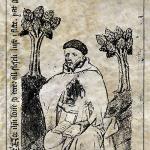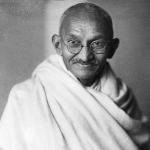
George Garrigues, 1962
Wikicommons
Recently I received a note asking about my meditation on David Loy’s book Nonduality in Buddhism and Beyond.
The writer said it was all so abstract. And wondered what it had to do with anything actually important.
Fair question, and I responded. Much of the content of that follows. Although I’ve had a chance to reflect for a minute or two and have deleted here and there and expanded a bit here and there from my original response. Still close to off the top. It’s a bit of a confession through two books. I am, after all, in addition to a Zen Buddhist, also a long time Unitarian Universalist, a strange sect with roots in Christianity and later humanism and now this and that, who seem to believe in salvation through bibliography.
In this case, Loy’s Nonduality and Stephen Prothero’s God is Not One. I recommend each for its different gifts.
The thing about David Loy’s Nonduality, and really why it is the more important of the two for me, is that it attempts to unpack the underlying view of reality that informs the whole Zen project. And does a good job, I feel. It was originally his doctoral dissertation, so it has that academic wash to the read, which was a problem for my correspondent. And I get that, it’s true, there’s tons of terminology. So, its not going to be everyone’s cup of tea.
And.
Stephen Prothero’s intriguing book God is Not One. In it he notes all the world’s religions have different views about what is wrong and what can put it right. For me the underlying point he seems to miss is that pretty near universal sense there is something wrong. He also notes that there appears to be something close to or perhaps universal in the Golden Rule.
But this is his big gift, all the great world religions arising with an observation that something is wrong that can be put right. Noticing the wrong, naming it in a useful way, and dealing with it certainly is the Zen project.
Perhaps you don’t notice some wrong in the world. The truth is one can profit from Zen as a self help thing, getting a bit bigger perspective, maybe relaxing a little. The mindfulness thing, and maybe more specifically the secular mindfulness thing has value.
And that’s not the project I care about. That’s not what drove me to fifty plus years of practice. I am interested in the wrong and how to address it.
As I look at it from the position of a product of the mid twentieth century global north, and in particular North America, I call that wrong existential angst. I’m good with most of the other terms available including those of the world religions, like sin and disobedience and what not, although they all require a level of unpacking that I find problematic. Dukkha is the best of the terms as I experience it. Dis-ease. Ultimate unsatisfactoriness. That constellation of things. I find the clearest resonance with that observation, that naming of the wrong.
Buddhism actually has two different takes on what the problem is and how to fix it. Or at least angles.
The story that the Buddha addressed was how our suffering, anguish, angst, the worm in every apple, continues over many many lifetimes, bound up with our intentions and the actions that arise from those intentions. Until we see past the stories, let go of it all, and find our liberation. From Nagarjuna on there’s a bit of a shift, small in some ways, but gigantic in others. This arc of existence and nonexistence isn’t rejected. Not precisely. But it doesn’t demand that story. The problem in the great swath of the Mahayana is articulated as a fundamental misunderstanding of how things are. And that grasping becomes more immediate, not an over many lifetime thing, but here and now. To be dealt with here and now.
As some say pain is inevitable, but suffering is optional.
Mahayana Buddhism and specifically Zen addresses the optional thing. Here. Now.
Nonduality in its Buddhist expression, most clearly the Mahayana Buddhist view of what how to go for the option of not suffering. The suffering that is not pain. That pain we live through as articulated in a play of causal conditions over which we have minimal control. How we meet it and how we live out of that meeting is the Zen project.
David Loy’s Nonduality outlines that in philosophical theological terms.
What is super important to me in that book is how it shows our Mahayana Buddhist analysis is only one of several ways that deeper story of our intimate connection can be understood. I find it amazingly liberating. It tells me that no religion gets it all right, thank you Professor Prothero for underscoring that; not even mine. With some good news. There are corrections and invitations in noticing how others have engaged pretty much the same question through similar but different lenses.
Does one have to study all this to profit from Zen and its disciplines? No. Absolutely not.
But for me Loy’s work and others pointing to those places where the insight I consider most important to who I am and how I meet the world, is expressed somewhat differently, but recognizably, has been helpful. On my own path of clarification it has helped me to see a bit more clearly how my own religious cultural assumptions that were shaped at my grandmother’s knee and in my childhood Sunday school form me in ongoing ways, even as I wholeheartedly embrace a basically Mahayana world-view.
And it has also opened for me the fact that the healing vision has both personal and social consequences. Consequences in the here and now.
On the personal level as I’ve engaged this path that can be called Zen Buddhist nonduality, informed by some examination of other nondual perspectives, for me most intimately what is found in Christian mysticism, it has led me on a path where I get to the bones my bones, but also see how who I am does not end at my skin, launching me into a life that is mysterious and beautiful even as it is harsh and dreadful.
But I find a social level, as well. I don’t end at my skin. And therefore I find myself caught up in other people’s lives. I find I care profoundly about what happens in our moment in Gaza and Israel with sympathies that don’t end at borders and are owned by one group of people but not another. I care about those who are caught up in systems of inequity. I worry most about hunger and homelessness, everything that can be called poverty. Poverty of spirit, totally. Poverty, naked poverty, absolutely.
And I see my limitedness. I am now seventy-five years old. As I watch the collagen melt away in my body, as arthritis brings pain that I cannot ignore in my hands and spine, as I stand up with increasingly complications; I am very, very much aware of limitations that are present and progressing.
Nonduality describes the relationships between my life and the lives of other people. It sings a story, mine, and everyone else’s in ways that make sense. And offers doors, only some of which I can walk through.
The human thing is to see the wrong and seek to name it and to seek to alleviate it.
It explores the nature of intimacy. And the vitality of things. And to use a mammalian naming, the family of things.
Nondual expressions seem the best for me. They help me to understand the play of my uniqueness and commonness, how I am precious and passing – and how I am related. Both among the persons, only some of whom are people, of this world, and the stuff of the cosmos.














